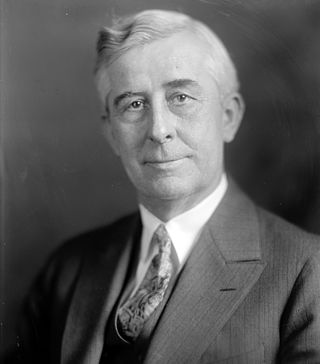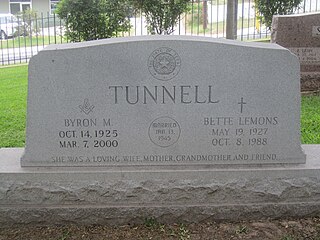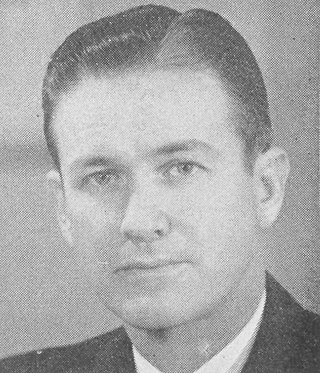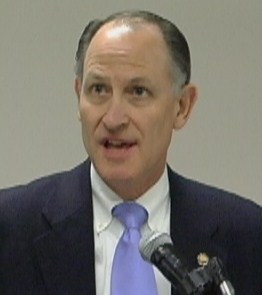This article relies largely or entirely on a single source .(January 2010) |
George Hartfield Sheppard (November 4, 1874 - January 18, 1949) was Texas State Comptroller from 1930 until he died in office in 1949.
This article relies largely or entirely on a single source .(January 2010) |
George Hartfield Sheppard (November 4, 1874 - January 18, 1949) was Texas State Comptroller from 1930 until he died in office in 1949.
Sheppard was born November 4, 1874, in Waco, Texas. The son of Andrew M. Sheppard and Sarah Hartfield, they left Waco for West Texas, where Sheppard was raised on a ranch.
He was educated in public schools around Abilene, Texas, and Ballinger, Texas, and in the summers, he attended normal institutes to be a schoolteacher. After graduation, he took a business course in Abilene, which prepared him for his later life. Sheppard also taught school in West Texas.
In 1910, he was elected Tax Assessor of Nolan County, Texas. He held that post for eight years. During this time, he served as president of the Texas Tax Assessors Association. At the end of his term, he did not run for reelection and was appointed by Governor William P. Hobby to transfer auto licenses. When that position expired, Sheppard returned to Sweetwater, Texas, where he began working for city government.
He worked as Secretary for the Board of City Development and was later elected mayor. After his terms as mayor, Sheppard retired to the private sector where he worked in the general insurance business. In 1930, he was appointed State Comptroller by Governor Dan Moody. After his appointment Sheppard ran for election nine times and was almost always elected by a large majority. He was elected to every office he ever ran for.
Because of Mr. Sheppard's active interest in tax matters, he became widely recognized as an authority in the field of tax administration. He gave special attention to the gasoline tax, which was the most lucrative source of revenue in Texas. After he took office, the revenue from the gasoline tax increased from $32,000,000 in 1930 to $69,000,000 in 1946.
After Sheppard became Comptroller the Legislature enacted a law imposing a tax on cigarettes and placed the administration of it in the Comptroller's Department. Once the law was in place two problems arose: cigarette peddlers and cigarette tax stamp counterfeiters. The peddlers operated from bordering States under the protection of interstate commerce while the counterfeiters flooded the State with cigarette stamps.
The weak State Cigarette Tax Law had to be strengthened and in 1935, the Legislature, after adopting Sheppard's recommendations, amended the law.
Included in this amendment was the Use Tax Law, the first ever enacted in the United States. With the enactment of the new law, the fight with the two rings began. The validity of the new law was contested and a bitter struggle ensued. The case was carried before the Supreme Court of the United States, where the law was upheld.
So successful was the Cigarette Tax Law that in 1936 it was accepted as a model to be recommended to State legislatures throughout the United States by the National Tobacco Conference at Cincinnati.
A diligent administration of the Cigarette Tax Law of 1935 was constantly maintained and the annual revenue, which in 1934 amounted to $3,603,000, grew to $18,977,000 in 1946, and became one of the State's main tax items. The total revenue from all sources for 1946 was $301,521,177.75.
One of the most difficult tasks that confronted Sheppard was the establishment and implementation of an entirely new system of accounting and bookkeeping for the State. His work paid off when the State obtained its first perfect accounting system. Through the thorough and systematic performance of his duties, Sheppard had an excellent record as State Comptroller. His political philosophy of impartially enforcing the tax laws and staying out of politics helped Sheppard to succeed. [1]
Sheppard was known as a quiet, soft-spoken family man with a wife and four daughters. He served on the Board of Stewards of the First Methodist Church in Austin. He was also a member of the Masons, belonging to the lodge, chapter and council at Sweetwater, and was identified there with the Benevolent and Protective Order of Elks.
George Hartfield Sheppard died of a heart attack while serving as State Comptroller. He was buried in the Texas State Cemetery in Austin, Texas.

Robert Douglas Bullock was an American Democratic politician from Texas, whose career spanned four decades. His service culminated in his term as the 38th Lieutenant Governor of Texas from January 15, 1991, to January 19, 1999, during the term of Governor Ann Richards and the first term of Governor George W. Bush. Bullock is the last Democrat to win and/or hold statewide office in Texas.

Richard Coke was an American lawyer and statesman from Waco, Texas. He was the 15th governor of Texas from 1874 to 1876 and was a US Senator from 1877 to 1895. His governorship is notable for reestablishing local white supremacist rule in Texas, and the disfranchisement of African American voters, following Reconstruction. Richard Coke was revered by many Texas Southern Democrats due to his perceived triumphs over Reconstruction era Federal control in Texas politics. His uncle was US Representative Richard Coke Jr..

Marion Price Daniel Sr., was an American jurist and politician who served as a Democratic U.S. Senator and the 38th governor of Texas. He was appointed by President Lyndon B. Johnson to be a member of the National Security Council, Director of the Office of Emergency Preparedness, and Assistant to the President for Federal-State Relations. Daniel also served as Associate Justice of the Texas Supreme Court.

Pat Morris Neff was an American politician, educator and administrator, and the 28th Governor of Texas from 1921 to 1925, ninth President of Baylor University from 1932 to 1947, and twenty-fifth president of the Southern Baptist Convention from 1944 to 1946. He served as Grand Master of Masons in Texas in 1946.
A tax holiday is a temporary reduction or elimination of a tax. It is synonymous with tax abatement, tax subsidy or tax reduction. Governments usually create tax holidays as incentives for business investment, although the arrangement has also been characterized as a form of corporate welfare that leads to a redistribution of resources away from smaller businesses and private citizens and towards monopolies and other forms of consolidated wealth.

Samuel Willis Tucker Lanham, was the 23rd Governor of Texas from January 20, 1903 to January 15, 1907. He was a member of the Democratic Party. Prior to winning election as governor, he served two periods in the US House of Representatives. He served five terms from the 11th District then ran for governor, losing in his first attempt. When he returned to Congress, it was in the Eighth District, where he served 4 terms.
The Robin Hood Plan is a colloquialism given to a provision of Texas Senate Bill 7 , originally enacted by the U.S. state of Texas in 1993 to provide equity of school financing within all school districts in the state of Texas. The plan is now codified within the Texas Education Code as Section 49.002.

Daniel W. Hynes is an American politician, formerly serving as the Illinois Comptroller.

Harry McLeary Wurzbach was an American attorney and politician. He was the first Republican elected to the United States House of Representatives from Texas since Reconstruction to be elected for more than two terms and was re-elected to the Sixty-eighth, Sixty-ninth, and Seventieth congresses, representing Texas's 14th congressional district for several terms, from 1921 to 1929. He was re-elected in 1930 to the Seventy-second Congress and died in office. The first Republican elected from Texas who was born in the state, he was the only Republican from Texas serving in Congress during this period.

The government of Texas operates under the Constitution of Texas and consists of a unitary democratic state government operating under a presidential system that uses the Dillon Rule, as well as governments at the county and municipal levels.

Byron Milton Tunnell was a state representative from 1957 to 1965, Speaker of the Texas House of Representatives from 1963 to 1965, and a member of the Texas Railroad Commission from 1965 to 1973.

Omar Truman Burleson was an attorney, judge, FBI agent and veteran of World War II when he was first elected in 1946 as a Democratic U.S. Representative from Texas's 17th congressional district. He was re-elected to Congress from this rural district for more than 30 years, resigning in December 1978 rather than run again for office.

The Wisconsin Department of Revenue (DOR) is an agency of the Wisconsin state government responsible for the administration of all tax laws, as well as valuing property and overseeing the wholesale distribution of alcoholic beverages and enforcement of liquor laws. The Department also administers the state's unclaimed property program and the state lottery.

Jeffrey Vincent Kessler is an American politician and former Democratic member of the West Virginia Senate in the United States, representing the 2nd district from 1997 to 2017. He is the former President of the Senate/Lieutenant Governor, Minority Leader of the Senate, Acting President of the Senate and Chairman of the Judiciary Committee. Kessler is also involved in private practice, where he is a partner in the law firm Berry, Kessler, Crutchfield, Taylor & Gordon.

The Texas Comptroller of Public Accounts is an executive branch position created by the Texas Constitution. The comptroller is popularly elected every four years, and is primarily tasked with collecting all state tax revenue and estimating the amount of revenue that the Texas Legislature can spend each biennium. The current comptroller is Glenn Hegar, who took office on January 2, 2015.
Texas State Treasurer was an elected constitutional officer in the executive branch of the state government of Texas, responsible for overseeing the financial operations of state government. The position was established in the Constitution of 1876. It was officially abolished on August 31, 1996.
Charles N. "Doc" Anderson is a veterinarian from Waco, Texas, who was a Republican member of the Texas House of Representatives for District 56. The district encompasses Waco and most of McLennan County. He was first elected in 2004.
Sam Houston Terrell was Texas State Comptroller from 1925 until 1930.
Marion Don Flanagan was an American football player. He was born in Sweetwater, Texas, played high school football there, and was one of the top high school players in the state. He played college football for the Texas A&M Aggies football team as a halfback, quarterback, and fullback from 1942 to 1943 and in 1946. He led the NCAA major colleges in 1942 with 403 receiving yards. Flanagan sustained a knee injury in 1943 that prematurely ended his season, nonetheless he was named 2nd Team All-Southwest Conference. After the 1943 season, Flanagan spent two-and-a-half years serving in the United States Navy during World War II. After his discharge, he returned to Texas A&M and was one of the leading punt returners in the 1946 season. He opted not to return to football in 1947, stating that he was retiring from the game due to the lingering impact of the knee injury he sustained in 1943. In September 1947, Flanagan married Janette Butts. He also served as an assistant football coach at Texas A&M in 1947.
The California Department of Tax and Fee Administration (CDTFA) is the public agency charged with assessing and collecting sales and use taxes, as well as a variety of excise fees and taxes, for the U.S. state of California. The department has several other ancillary functions, such as ensuring that sellers comply with permit requirements. The department was formed on January 1, 2018, by the Taxpayer Transparency and Fairness Act of 2017, which reduced the California State Board of Equalization to its constitutional functions of supervising county tax assessors and assessing certain specified types of property.